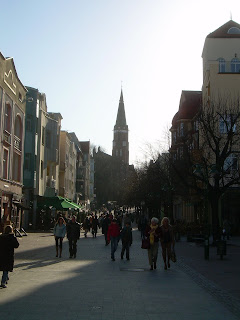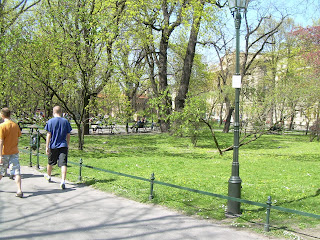All Along the Watchtowers
We were supposed to be going with Three Bottle Josh and Bergin, but they pulled out at the last minute and left me alone with Jen. She's a very short, round-faced, pudgy girl who talks only about how excellent her Swedish is (not very), how Filipino she is (even less), and her ex-boyfriend who lives in "StockHOLM". Always the dramatic emphasis on the last syllable: one of those lazy linguistic habits I cannot resist mocking. She is oblivious to absolutely everyone else and has an odd manner of walking, so upon meeting her, you are left immediately with the impression of a small, pugnacious dirigible with no one at the steering controls.
Anyway. It was one of those "overnight there, eight hours in the city, overnight back" arrangements, like the time I went to Tallinn. I did my best to ditch Jen the instant I got on the boat and quickly and accidentally made friends with the drummer of the band, who happened to be from Hollywood, Florida. He also turned out to have played bass with Marilyn Manson and told stories about back when they were "Marilyn Manson and the Spooky Kids" and their gimmick was that they all carried plastic lunchboxes.
Most of that evening was pretty quiet. I went up to the pub rather early, since there was nothing else to do, and sat in the quiet gloom, enjoying myself. There is nothing quiet like the gently vibrating promise of the first drink in a quiet, empty bar. I love the high tactile sound of spotless glasses being dried with a fresh towel, the cascade of ice into the bin, the hollow squeak of shoes on a still-dry floor. You can see the bartenders, knowing what is coming, battening down their mental hatches in preparation. Steeling themselves, and appreciating the quiet dignity with which you consume your whiskey.
There is something about the rows on rows of upside-down glasses suspended from the ceiling, the light filtering through them against the flat black paint behind. It reminds me somehow of cold space and M. John Harrison; it evokes an image of the Atalanta in Calydon screaming down from perihelion to the low cemetary orbit, running below the lines of the long reaction guns, then suddenly cartwheeling twenty thousand miles, spraying the bright precious liquid of her life out into the vacuum. At once my mind is a collision of Coleridge and Keats, and it becomes increasingly clear that we of the twilight period of our college lives, faced with the growing horror of what I refer to as the Quarter-Life Crisis are simply waiting for an albatross that isn't coming. We are instead the heirs of a globalized Othrys, making our little nests in the hopes and achievements of those giants who came before us.
Oh, Swinburne, I always think. Pity everyone insists on reading Byron instead.
So I had a drink for those who go down to the sea and up to the stars in ships. I had another in honor of great, unknown writers everywhere. Concerned the first hadn't reached its destination on time, I sent another down as a search party, then another to head them both off at the pass.
The band played remarkably well for three dudes who are all named Rich.
There isn't much to Helsinki. There is the big Senate Square, which you will recognize if you've seen Jim Jarmusch's Night on Earth (and you certainly should have). The Lutheran Cathedral looms rather glumly above the square, as though depressed that it is not nearly of the caliber of cathedrals you see in Prague, Krakow, Vienna, Saltzburg, or any of a couple dozen cities in Europe. The square is also the site of the city and national government buildings, the university, the city library, several tourist shops, and a monument to Tsar Alexander II.


You have now seen pretty much all of Helsinki.
Of course, there is almost unlimited fun to be had with Finns and the Finnish language. It is of immense interest to me that the Swedes have exactly the same stereotype of Finns as we have of Swedes: that they're all blonde, their women are easy, are rather bland, drink a lot, and they speak a silly language. I highly recommend hiring a Swede to do an impression of a Finn for your next party.
For your reading hilarity, the following are actual Finnish words I saw in Helsinki:
Kuusikymmentäviisi
Krapularyyppy
Myyntineuvottelija
Päälliköitä
Ympärileikattu
I think I speak for everyone everywhere when I say, "Man, what?"
So I spent eight hours wandering around Helsinki. Saw the weird monument to Sibelius, the mildly-famous Finnish composer:

Yeah, and when the wind blows in from the Bay of Finland just right, the monument makes this weird low moaning noise. I can only hope when I'm quite dead, some lunatic makes a similarly bizarre and alarming monument to me. You can't see it in this picture, but over on the right, there's a giant metal carving of Sibelius's face, with empty eyes, and it stares out at you, surrounded by weird bits of scrap metal.
All of this, of course, has led me to the highly accurate conclusion that Finns are actually from the moon. Think about it! They speak a crazy moon-language. They have crazy moon-monuments to their crazy moon-people. They eat moon-food. My notes from that afternoon increasingly began to look like this:
MOON JOURNAL, DAY 1: I have taken refuge in some sort of MOON-PIZZA JOINT. I can see the MOON-PEOPLE all around me now, some of them wearing outlandish MOON-HATS. I have ordered a pizza with ham on it, and the MOON-MAN here has attempted to communicate. I fear the worst.
At any rate, I spent a couple hours riding the 3T tram around the city, since it makes a figure-8 through the whole place, and there really isn't anything else to do. I saw the waterfront and a strange store which apparently sells medieval Japanese assassins:


Then I gathered up Jen and headed back to the boat to buy some cheap, tax-free whiskey. We headed up to the bar early again, and it was full of Finns watching a Manchester United game. The band was skidding along, and a guy who looked exactly like Junichiro Koizumi bought the band beers, as he smiled and sang along to Creedence. I began to suspect it was, in fact, Junichiro Koizumi, since, let's face it, that's the sort of thing he'd do.
I found myself sitting next to a fat, bald Finnish man who was telling me about his Russian wife in more detail than I cared to receive. I told him I'd heard that Finnish people couldn't drink.
He was incensed and there was nothing for it but to prove that he could outdrink me. I said that was all well and good, but I'd also heard Finnish people didn't even know good liquor when they tasted it, since all they drink is cheap rotgut stuff. He turned apoplectic colors. His eyebrows did push-ups, his jaw attempted to cartwheel, and over my locquatious protests, he insisted on buying round after round of Chivas Regal 18-year old.
He was snoring on the table shortly thereafter. I sat in the back corner while Jen yammered away, and turned to the German next to me exactly as the band hit the right part of the right song at the right time:
"There must be some kinda way outa here," I said. "There's too much confusion. I can't get no relief."
"I just want to be an investment banker," he said.
"Christ."
The band got into some sort of fight thereafter, and I found myself left alone in the now-empty bar with Rich the six-foot-seven lead guitarist, who loved Bukowski and honestly believed that aliens had seeded life on Earth and were now watching, much to their amusement.
"This has been a night on the weird scale," he kept saying.
"Man," I told him. "This is a pretty regular Tuesday for me."
He spent some time reminiscing, some time being bitter and angry at Rich the drummer, and then resolved to go back to school and get his masters in theology.
"This is a bit of a surprising turn of events," I said.
I don't remember much after that. I'm pretty sure the night just sort of fizzled out. Jen apparently made out with some Finnish guy and came back to the cabin and took a shower, then got into bed without bothering to put on clothes--I know this because I woke up with remarkably little hangover, only to be gobsmacked with the objectionable sight of an ass I can only describe as elephantine.
Not much else to report about that trip. Helsinki isn't much worth seeing, to be quite honest, and while drinking with the band was entertaining, and the liquor on the boat was cheap, it was only about worth the zero dollars I paid to go. And now I'm all nicely stocked up for the big Valborg celebrations this weekend, which I expect to blog about at some length next week.
What I'm Reading
Garrett Mattingly, Renaissance Diplomacy
Karl Polanyi, Origins of Our Time
















